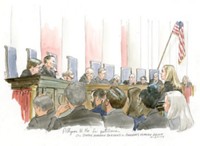Advertisement
Grab your lab coat. Let's get started
Welcome!
Welcome!
Create an account below to get 6 C&EN articles per month, receive newsletters and more - all free.
It seems this is your first time logging in online. Please enter the following information to continue.
As an ACS member you automatically get access to this site. All we need is few more details to create your reading experience.
Not you? Sign in with a different account.
Not you? Sign in with a different account.
ERROR 1
ERROR 1
ERROR 2
ERROR 2
ERROR 2
ERROR 2
ERROR 2
Password and Confirm password must match.
If you have an ACS member number, please enter it here so we can link this account to your membership. (optional)
ERROR 2
ACS values your privacy. By submitting your information, you are gaining access to C&EN and subscribing to our weekly newsletter. We use the information you provide to make your reading experience better, and we will never sell your data to third party members.
Safety
Hedge fund manager wins U.S. drug patent challenges
Federal tribunal tosses out Shire, Celgene claims
by Glenn Hess, special to C&EN
November 2, 2016

Hedge fund manager J. Kyle Bass’s controversial campaign of challenging the validity of U.S. drug patents scored a pair of victories in late October.
In the first, the federal Patent Trial & Appeal Board determined that most of Shire plc’s claims for its short bowel syndrome drug Gattex are invalid. The tribunal then nullified two patents related to Celgene’s cancer drugs Thalomid, Revlimid, and Pomalyst.
In both cases, the board ruled that the patent claims were invalid because they were obvious in light of earlier patents and scientific journal articles.
The board, part of the U.S. Patent and Trademark Office, has agreed to review several other patents Bass’s Coalition for Affordable Drugs has challenged. Its next decisions are due in February 2017.
The coalition filed almost three dozen petitions in 2015 and 18 were accepted for a patent validity trial. Bass’s group lost its first trial in early October.
The victories mark the first time a non-player in the drug market has successfully challenged pharmaceutical patents. However, the decisions are likely to be appealed to the federal courts.
Bass, the billionaire founder of Hayman Capital Management LP, has said that his goal is to challenge questionable drug patents to remove barriers that brand-name pharmaceutical companies use to prevent generic competition and keep prices high.
But the pharmaceutical industry and other critics have charged that Bass is abusing the patent review process as part of a short-selling investment strategy. They believe his hedge fund bets against, or shorts, the shares of the companies that own the challenged patents and thus profits if their stock prices drop.
Drug industry lobbying groups have urged Congress to exempt certain biopharmaceutical patents from challenge under the patent office’s procedure called inter partes review (IPR), arguing that not doing so could threaten the development of new medicines.
Patent attorneys, however, say the system for challenging the validity of patents after they’ve been issued seems to be functioning well. In addition to voiding unworthy patents, they point out that the process is also weeding out weak challenges to valuable patents.
“I would say that the IPR system is working as intended, which in my opinion was to make it easier to invalidate patents, whether the patents are ‘good,’ ‘bad,’ or otherwise,” says Paul B. Henkelmann, a partner at the Chicago office of Fitch, Even, Tabin & Flannery, an intellectual property law firm.
The fact that Bass has been successful in challenging some patents weakens the argument that he is abusing the system, Henkelmann notes. “If his petitions were completely baseless, then he would not be likely to win,” he remarks.
“That Bass uses IPR challenges for his personal benefit as part of an investment strategy is bothersome,” Henkelmann adds. “But the current statutory scheme is agnostic regarding the intent and purpose behind a petition for review, and the Patent Trial &Appeal Board has previously found that having a profit motive is not inherently an abuse of process.”



Join the conversation
Contact the reporter
Submit a Letter to the Editor for publication
Engage with us on Twitter